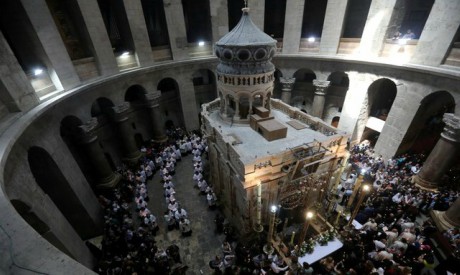
File Photo: Christian worshippers surround the Edicule as they take part in a Sunday Easter mass procession in the Church of the Holy Sepulchre in Jerusalem's Old City April 16, 2017 (Reuters)
Church leaders in Jerusalem shut the Church of the Holy Sepulchre on Sunday in protest at a new Israeli tax policy and a proposed land expropriation law which they called a "systematic and unprecedented attack against Christians in the Holy Land".
Roman Catholic, Greek Orthodox and Armenian church leaders said the holy site, a popular stop for pilgrims and where many Christians believe Jesus was crucified and buried, would remain closed until further notice.
Later on Sunday, an Israeli cabinet committee is due to consider a bill that would allow the state to expropriate land in Jerusalem sold by churches to private real estate firms in recent years.
The stated aim of the bill is to protect homeowners against the possibility that private companies will not extend their leases. The churches, major landowners in the city, say such a law would make it harder for them to find buyers for their land.
"This abhorrent bill ... if approved, would make the expropriation of the lands of churches possible," said the statement by Theophilos III, the Patriarch of Jerusalem, Francesco Patton, the Custos of the Holy Land, and Nourhan Manougian, the Armenian Patriarch of Jerusalem.
In addition, Israel's Jerusalem municipality has cancelled a tax exemption granted to church-owned commercial properties in the city and has begun to demand back payments from the churches.
"This reminds us all of laws of a similar nature which were enacted against the Jews during dark periods in Europe," the church leaders said.
Jerusalem Mayor Nir Barkat said on Twitter it was illogical to expect that church-owned commercial property, including hotels and retail businesses, would continue to enjoy tax-exempt status.
"Let me make it clear: we are not talking about houses of worship, who will still be exempt from property tax, according to law," he wrote.
Short link: